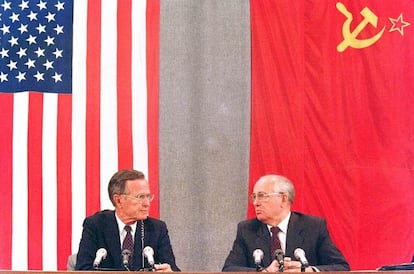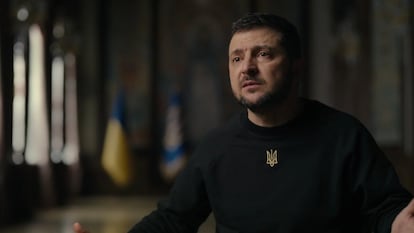‘Turning Point’ director Brian Knappenberger: ‘Propaganda has always been a part of war’
The second season of the Netflix documentary focuses on the atomic bomb and the Cold War, and how those events are linked to Vladimir Putin’s invasion of Ukraine


There are moments in history that can change the world forever, such as the attack on the Twin Towers in 2001 and, before that, the Manhattan Project, so topical because of the success of the Oscar-winning Oppenheimer in theaters, and because of headlines in the press. Netflix’s documentary series Turning Point began by analyzing 9/11 and now becomes an anthology with a second season focusing on the atomic bomb, the Cold War, and its various connections to the present-day geopolitical situation.
Beginning with the proliferation of nuclear weapons, the nine-episode documentary The Bomb and the Cold War traces the conflict between the Eastern and Western blocs, traversing the collapse of the Soviet Union, the rise of Vladimir Putin, and the Kremlin’s 2022 invasion of Ukraine.
If the first victim of war is the truth, what happens in the era of fake news? “The world that we live in, where wars are playing out online, in social media, means that the non-political, the investigative, journalistic approach is more needed than ever,” said the director of the series, Brian Knappenberger, in an interview with EL PAÍS in mid-March from New York, days before the Crocus City Hall bombing in Moscow. “I think this shows up pretty dramatically now because you’re starting to see a kind of rise of the myth of Stalin again in a positive way. Somebody in the series says that it’s weaponization of history, that Stalin is being looked at as potentially a decent figure in history. That’s pretty alarming and may tell us more about where Russia is headed.”
For Knappenberger, narrative was important in World War I, even more important in World War II, and eventually became one of the key elements in the Cold War. “Propaganda has always been a part of war, but there’s something about the Cold War, which was dominated by massive arsenals of nuclear weapons on both sides, weapons that could, if deployed, destroy all life on Earth,” he says.
In the second season of Turning Point, Knappenberger presents the results of more than 100 interviews conducted in seven countries around the world over the course of 10 hours of runtime. Through these, he attempts to tell deeply personal stories that reveal the ongoing impact of the Cold War. They range from survivors of the atomic bomb dropped on Hiroshima to world leaders past and present, including Ukrainian President Volodymyr Zelenskiy, and prominent political figures such as NATO Secretary General Jens Stoltenberg, former CIA director Robert Gates, and former U.S. secretary of state Condoleezza Rice.
Historical mirage
George H. W. Bush, the U.S. president when the Berlin Wall came down, said at the time: “By the grace of God, America won the Cold War.” “But of course, history didn’t end there,” the director says. The series asks the audience to consider whether this unifying milestone between East and West Germany ended the conflict between the two great political blocs or whether, on the contrary, it was just a historical mirage.
Knappenberger insists that the Cold War was a confrontation between competing narratives: “In America, it’s about individual freedom and democracy. But the Soviets had a different story: that capitalism was running amok, that it was creating a stratospheric difference between the rich and the poor, and that communism was the right path,” he says. “Putin is a child of the Cold War. He was a KGB agent in Dresden when the Berlin Wall fell. Putin’s vision of the Cold War and World War II is riddled with errors. Obviously, it’s not factually accurate. But there are grains of truth in it that he’s able to build on to justify his actions in Ukraine.”

A change of structure
The idea on which the second season of Turning Point was conceived was to create a more or less chronological story with a focus on nuclear weapons. Just two months after production began, Russia invaded Ukraine. Putin has defined the collapse of the Soviet Union as one of the greatest geopolitical tragedies in history. “We realized that this was no longer a historical documentary, but a reflection on a very present issue. The Cold War was definitely starting to heat up. Knowing what happened then is crucial to understanding the world today,” Knappenberger notes.
The structure of the episodes changed from that moment on: the showrunners decided to start each episode with a topical fragment, followed by the credits, and then the chronological story they had planned to tell from the beginning. “We don’t know how [the war in Ukraine] going to play out yet. It’s every bit as disturbing and urgent as it was two years ago. We’re just past the two-year anniversary and we’re all asking some of the same questions. What does this mean for democracy in Europe? What does this mean for security in Europe? What does this mean for the world order? How likely is it that Putin will actually resort to nuclear weapons in Ukraine?”
An admirer of the award-winning film about Robert Oppenheimer, Knappenberger’s documentary seeks to pick up the conversation from Christopher Nolan’s story. “That initial invention of the bomb and that scientific advancement is, for us, the beginning. The invention of nuclear weapons is a kind of turning point in human history. How do we react to the invention of a weapon that can destroy us? This is the story of that weapon and of how we react to it,” he says.
Sign up for our weekly newsletter to get more English-language news coverage from EL PAÍS USA Edition
Tu suscripción se está usando en otro dispositivo
¿Quieres añadir otro usuario a tu suscripción?
Si continúas leyendo en este dispositivo, no se podrá leer en el otro.
FlechaTu suscripción se está usando en otro dispositivo y solo puedes acceder a EL PAÍS desde un dispositivo a la vez.
Si quieres compartir tu cuenta, cambia tu suscripción a la modalidad Premium, así podrás añadir otro usuario. Cada uno accederá con su propia cuenta de email, lo que os permitirá personalizar vuestra experiencia en EL PAÍS.
¿Tienes una suscripción de empresa? Accede aquí para contratar más cuentas.
En el caso de no saber quién está usando tu cuenta, te recomendamos cambiar tu contraseña aquí.
Si decides continuar compartiendo tu cuenta, este mensaje se mostrará en tu dispositivo y en el de la otra persona que está usando tu cuenta de forma indefinida, afectando a tu experiencia de lectura. Puedes consultar aquí los términos y condiciones de la suscripción digital.








































